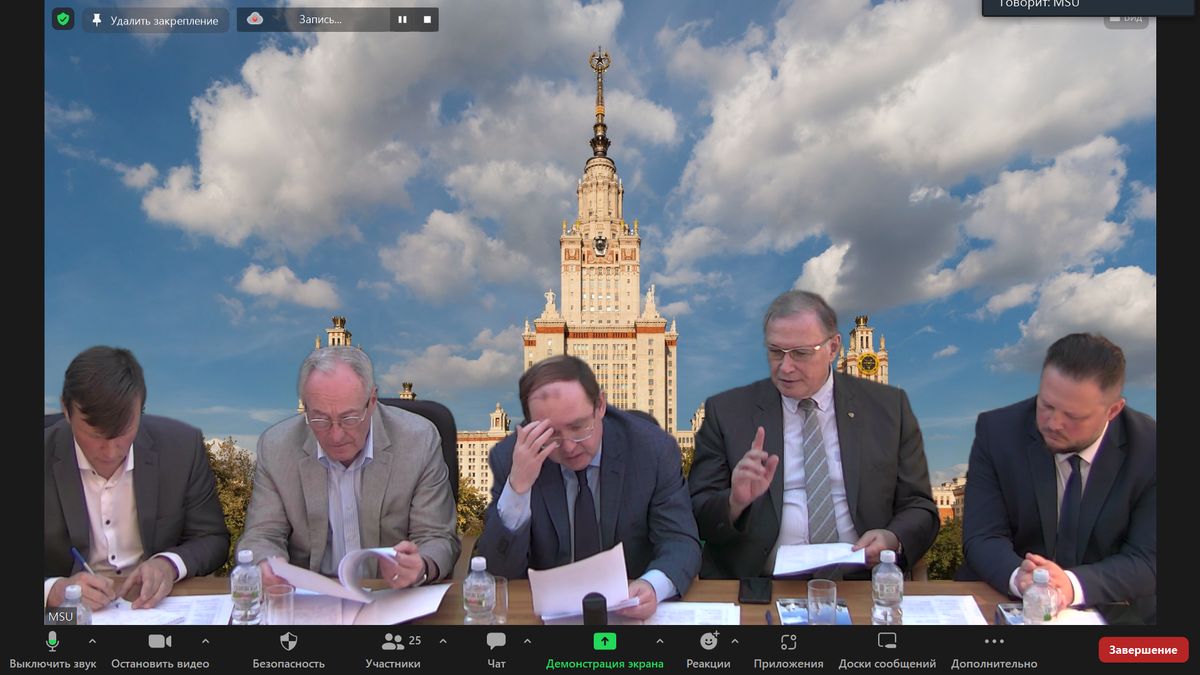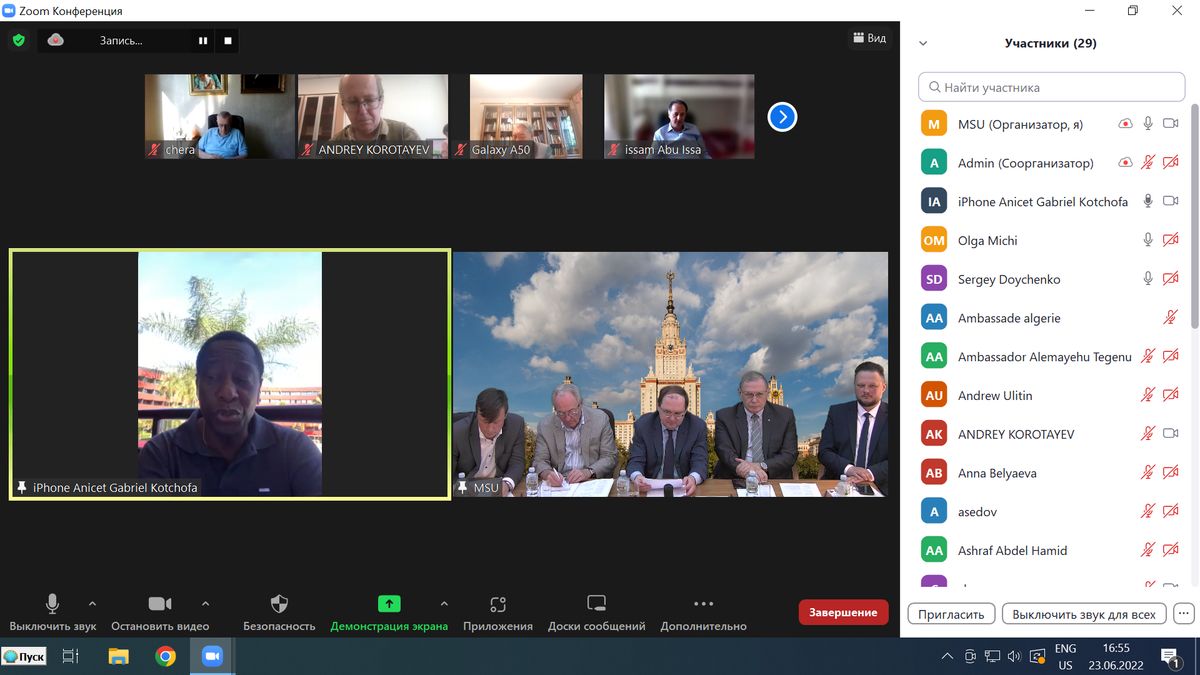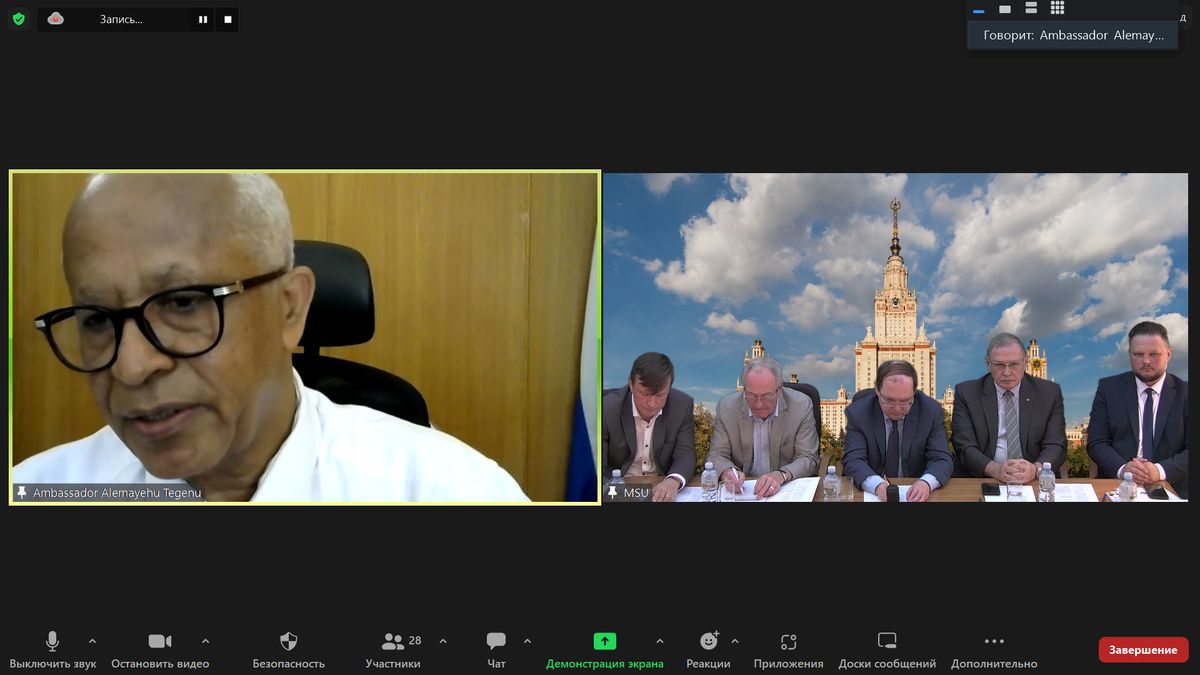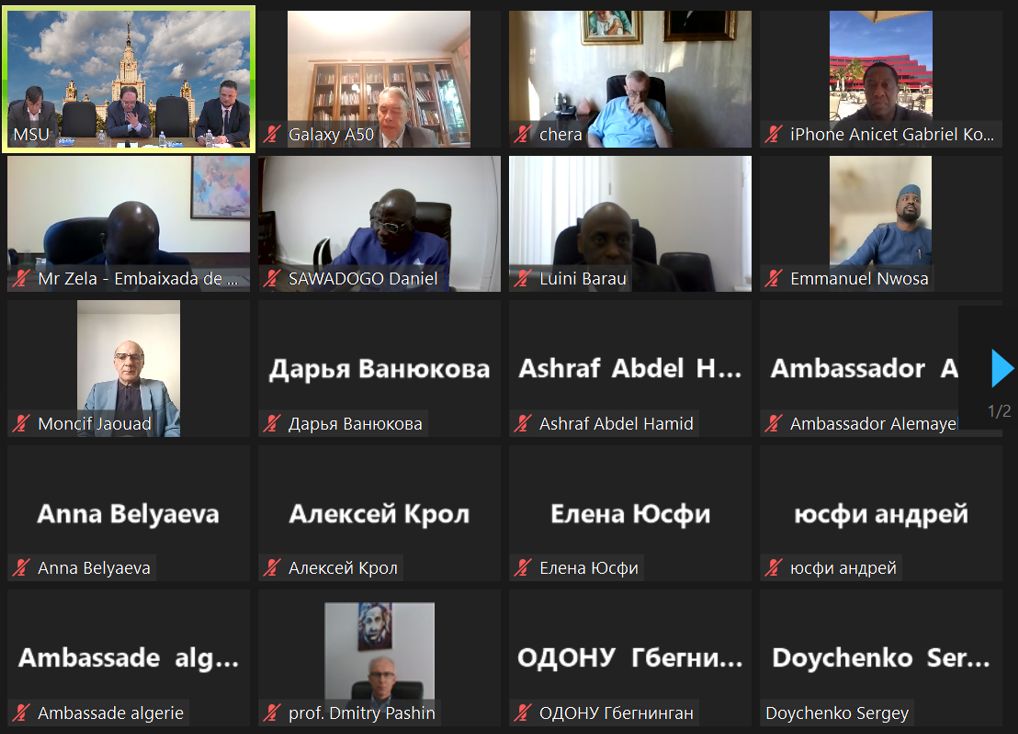June 23, 2022 Opening of Russian-African Club on the eve of the Second Summit of Russia-Africa Partnership Forum
Round table meeting on “Establishment of the Russian-African Club” was held on June 23, 2022. The creation of the Club was initiated by the Faculty of Global Studies of Lomonosov Moscow State University, the Commission for Ethnocultural Development of the Council for Nationalities under the Government of Moscow, the Public Diplomacy Foundation supported by the Russia-Africa Partnership Forum Secretariat.
Ambassadors and representatives of African states’ embassies, heads and researchers of museums, universities heads and professors, Africanists, etc. were invited to the constituent meeting of the Club.
The Dean of the Faculty of Global Studies of Lomonosov MSU, Professor, Doctor of Political Science Ilya Vyacheslavovich Ilyin addressed the participants of the round table with a welcoming speech. He stressed that the intention of the Club initiative is to unite all those who associate their interest and their destiny with the strengthening of business and cultural ties between Russia and the countries of the African continent. Ambassadors and diplomats of African countries and Russia, scientists, journalists, cultural luminaries, travelers and entrepreneurs can become members of the Club. He also added that a fairly large number of African students study at the faculty, and that Moscow State University is interested in strengthening academic ties with the countries of the African continent.
The next speaker of the round table was Ambassador-at-Large to Africa, Head of the Secretariat of the Russia-Africa Partnership Forum Oleg Borisovich Ozerov. He told the participants about his recent participation in the St. Petersburg International Economic Forum and about the business dialogue at the Russia-Africa Forum, dedicated to the priorities of Russian-African cooperation amid the changing world order.
Mr. Ozerov stressed that new mechanisms for cooperation with African countries in all areas must be developed due to a completely new geopolitical situation. Therefore, the creation of the Russian-African Club is an important milestone in the preparations for the Second Summit of the Russia-Africa Partnership Forum. He believes that the key to the success of the Russian-African Club is the very platform on which it is created, since the scientific activities of the Faculty of Global Studies are directly connected with the research of the latest global geopolitical processes. Mr. Ozerov thanked the Faculty of Global Studies for its initiative to set up the Russian-African Club and wished them successful work.

Then the Chair of Commission for Ethno-Cultural Development of the Council for Nationality Affairs under the Government of Moscow Alexander Fedorovich Berdnikov addressed the participants of the constituent meeting. He spoke about the work on the creation of the Museum of African Culture. According to him, the topic of establishing a museum arose back in the USSR. The collections of African countries have been replenished all these years, thanks to African scientists, diplomats, and travelers. Now the State Museum of Oriental Art possesses a unique collection of African artifacts, which makes it possible to embark on the practical implementation of the decision to set up a museum. Mr. Berdnikov expressed hope that on the eve of the Second Russia-Africa Partnership Forum, the issue of establishing the Museum of African Culture in Moscow would finally be resolved.
Professor Anicet Gabriel Kochofa, President and CEO of VEGARUS GROUP business initiative in Africa, CEO of the International Alumni Coordination Council, ex-Ambassador of Benin in Russia addressed the meeting participants with a telling speech. According to Mr. Kochofa, Africa has always been of great importance for Moscow State University, since many African students have studied here at all times. Many graduates now occupy leading positions in business, politics and science. According to the expert, more than 100,000 graduates from educational institutions of the USSR and Russia are ready to become active members of the Russian-African Club. It is they who will become ambassadors of goodwill and people's diplomacy, which will make it possible to achieve great success in comprehensive cooperation. He expressed confidence that the Russian-African Club on the basis of the Faculty of Global Studies of Lomonosov MSU will lead a dynamic and successful activity and thanked the representatives of African countries for supporting this initiative.

His Excellency Argau Almemayehu Tegenu, Ambassador of the Federal Democratic Republic of Ethiopia to the Russian Federation, addressed the audience. The diplomat recalled that relations between the African continent and the USSR, and then Russia, have a long history, especially in the issue of the African countries’ liberation from colonial regimes. As emphasized by the Ambassador of Ethiopia, the Russian-African Club’s mission is an integral part of a very important work on further cooperation in the field of investment and other areas. According to the expert, it is very important to establish relations between Moscow State University and universities of the African continent. His Excellency recalled that at the First Summit of the Russia-Africa Partnership Forum in 2019 in Sochi, a program and a declaration were adopted calling for concrete practical steps. It is necessary to move to practical actions. In the matter of strengthening cooperation between Russia and countries of the African continent, there is a huge basis for partnership considering a very large number of African graduates from Moscow State University and other Russian universities. The Ambassador attached particular importance to the initiative to establish the Museum of African Culture, as this will contribute to the preservation of the historical and cultural heritage of African countries. The Ethiopian Ambassador expressed his gratitude to Moscow State University, represented by the Faculty of Global Studies, for strengthening comprehensive cooperation with African states.

The importance of the Museum of African Culture initiative was also emphasized by Daria Vladimirovna Vanyukova, senior researcher at the State Museum of Oriental Art. She said that the museum is doing a lot in strengthening relations between Russia and Africa. Over the long years of its activity the museum carried out many exhibitions and expositions, representing the African peoples’ cultures. All African countries, after gaining independence, had access to museum sites to demonstrate their culture achievements.
Representative of the Moscow Chamber of Commerce and Industry, Chairman of the Commission for Foreign Policy Cooperation with African Countries, MSU graduate Konstantin Fedorovich Anastasiadi stressed that in recent years the African theme has become trendy. There is a social movement at the African desk in the Moscow Chamber of Commerce and Industry. “As part of the Commission’s work we are trying to get away from the political sphere and concentrate on economic agreements,” the speaker noted. He also mentioned that the Association of University Graduates from African Countries was established under the auspices of the Commission. This is a joint initiative of RUDN University and MCCI. The transformation of activities in the current global situation and the emphasis on the specialists training quality to meet new realities is of particular importance in the work of the Russian-African Club.
Igor Erikovich Krugovykh, First Deputy Chairman of the All-Russian public organization “Assembly of the Peoples of Russia”, shared with the participants his vision of the prospective activities of the Russian-African Club. He quoted from the speech of Russian President Vladimir Putin, who said: “We are striving to develop economic, humanitarian, cultural ties with African countries and will exert best efforts to develop this process.” According to the speaker, the African continent has great prospects, and relations need to be developed in all areas, including in the education sector. Mr. Krugovykh proposed dedicating one of the venues of the Second Russia-Africa Partnership Forum to discussing the new role of African countries in global processes in today’s changing world. According to the expert, it would be very important to establish a thematic scientific and educational association between African universities that deal with the global processes subject and the Faculty of Global Studies of Lomonosov Moscow State University.
The next speaker was Andrey Vitalyevich Korotaev, Leading Researcher at the Institute for African Studies of the Russian Academy of Sciences. In his opinion, the initiative to create the Russian-African Club is a promising endeavor. The expert noted that the research activities expansion in the countries of the African continent, including in sub-Saharan Africa, is of the greatest importance. It is necessary to set up organization of research expeditions to these countries, and to pay considerable attention to this area in the work of the Russian-African Club.
Dmitry Mikhailovich Pashin, Vice-Rector for Digital Transformation and Innovation at Kazan Federal University, also expressed his full support for the Russian-African Club initiative. He emphasized that this is an important prospect for Kazan University, as the university has significant achievements in this direction, in particular, research and development groundworks in the field of African continent studies.

Summing up the round table results, Mr. Ilyin, Dean of the Faculty of Global Studies, expressed confidence that the establishment of the Russian-African Club received the support from representatives of African countries, particularly from 15 countries at this stage, as well as from various public, cultural and academic organizations, who took part in this meeting. “We need to meet the agenda and look ahead to the future together. Interaction between Russia and the African continent is of strategic importance,” summarized Mr. Ilyin.







